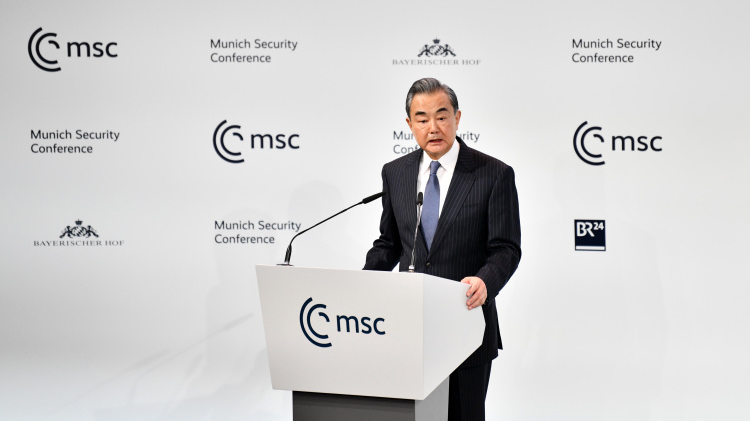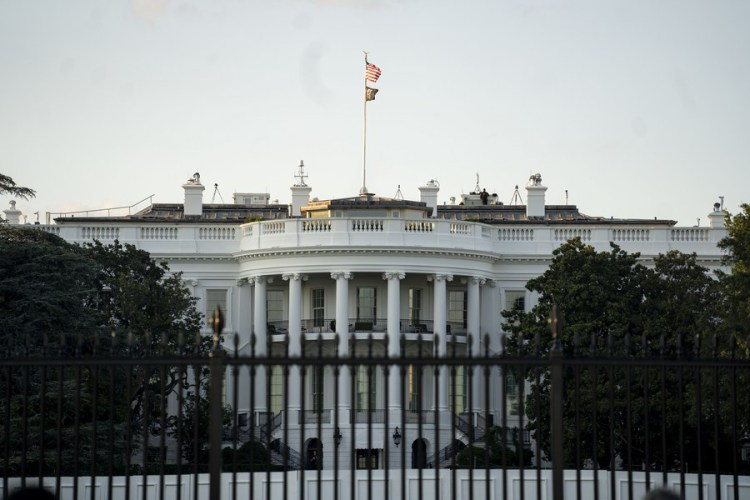
Wang Yi, a member of the Political Bureau of the Communist Party of China Central Committee and director of the Office of the Foreign Affairs Commission of the CPC Central Committee, delivers a keynote speech during the Munich Security Conference in Munich, Germany, February 18, 2023. /Xinhua
Wang Yi, a member of the Political Bureau of the Communist Party of China Central Committee and director of the Office of the Foreign Affairs Commission of the CPC Central Committee, delivers a keynote speech during the Munich Security Conference in Munich, Germany, February 18, 2023. /Xinhua
Editor's note: Andrew Korybko is a Moscow-based American political analyst. The article reflects the author's opinions and not necessarily those of CGTN.
Director of the Office of the Foreign Affairs Commission of the Communist Party of China (CPC) Central Committee Wang Yi and U.S. Secretary of State Antony Blinken met in Germany during the Munich Security Conference on February 18. This was their first in-person interaction since this month's unexpected incident with a Chinese civilian airship, which accidentally flew off course over the U.S. mainland and was then ordered by U.S. President Joe Biden to be shot down by fighter jets.
Reports indicate that the two senior diplomats discussed this issue during their informal meeting, though each side of course has a different take on what happened. The U.S. failed to share any evidence substantiating its speculation that the Chinese civilian airship that was researching the weather was really a clandestine reconnaissance vehicle. The Pentagon also said that it didn't pose a threat. These facts thus extend credence to China's criticism that shooting it down was a hysterical overreaction.
Nevertheless, there still appears to be a mutual desire to improve bilateral ties. This was first expressed by Chinese President Xi Jinping and U.S. President Joe Biden during their meeting at the G20 Summit in Bali in mid-November. Furthermore, the American leader reaffirmed this intention during his address to the nation last week in response to the balloon incident, where he said that "We're not looking for a new Cold War."
Words need to be followed by actions in order to prove their sincerity so it's not possible right now to assess how serious the U.S. is about this, but the informal meeting between their top diplomats can be interpreted as a step in the right direction. After all, despite the U.S. spree of provocations against China over the years, it's still a welcome sign that Blinken sought to meet with Wang in spite of pressure at home from some extreme Sinophobic forces in the aftermath of the balloon incident.
This in and of itself suggests that the Biden administration won't let anyone influence its foreign policy, not anti-China hardliners somewhere else in the government or average folks whose perceptions were manipulated by those same forces into opposing a rapprochement with China. Observers therefore shouldn't dismiss President Biden's words about "not looking for a new Cold War" out of hand because he very easily could have ordered Blinken not to meet with Wang.

The White House in Washington, D.C., the United States,September 3,2021. /Xinhua
The White House in Washington, D.C., the United States,September 3,2021. /Xinhua
By letting their informal meeting go ahead in defiance of the Sinophobic lobby at home, China and the U.S. were able to proverbially break the ice in a meaningful sense after the balloon incident. Speaking candidly about sensitive issues such as that one, the Ukrainian conflict and others is required in order to better manage their ties, seeing as how they represent the most important partnership in the world. Improving China-U.S. relations would help restore stability and get globalization back on track.
That's in everyone's interests, hence why it's important that the U.S. sincerely remains committed to having it happen. Blinken told NBC's "Meet The Press" in an interview after his informal meeting with Wang that there should be open lines of communication between the U.S. and China. In his words, "This is something that the world expects of us – they expect us to manage this relationship responsibly, and so it was important that we had that opportunity this evening here in Munich."
To be clear, there are no indications that anything of tangible significance like reopening lines of communication was agreed upon over the weekend. That said, this also doesn't mean their informal meeting wasn't fruitful. By reestablishing face-to-face dialogue between their top diplomats, they're now in a comparatively better position to restart discussions on climate change, COVID-19, inflation, the Ukrainian conflict, and other such issues.
It's premature to predict any details about these talks, it's enough to note that the U.S. isn't trying to "isolate" China like it's doing Russia, which suggests that President Biden is indeed serious about "not looking for a new Cold War" with China. He, Blinken, and other key figures in the administration now need to take the next step to stop provoking China across all domains –media, military, tech, trade, etc. – and begin working to improve their ties.
Visiting Beijing sometime later this spring would certainly help in that respect, but for this to happen, tangible progress must first be made. Hopefully Blinken and those around him will get to work on offering pragmatic cooperation proposals to China upon their return to Washington, after which he can discuss them with Wang and find some common ground.
(If you want to contribute and have specific expertise, please contact us at opinions@cgtn.com. Follow @thouse_opinions on Twitter to discover the latest commentaries in the CGTN Opinion Section.)